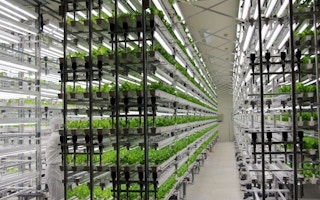Electronics maker Fujitsu Ltd has begun selling low-potassium lettuce, which is grown in a special clean room at its semiconductor plant in Aizu-Wakamatsu, Fukushima Prefecture.
Normally, vegetables need to be heated to decrease potassium levels. However, patients suffering from kidney disease or those undergoing dialysis — who are restricted in their potassium intake — can now enjoy salad made with Fujitsu’s lettuce, which the company began selling May 7.
Fujitsu renovated a section of one of its virtually dust-, germ- and sunlight-free clean rooms at the plant to create the Aizu-Wakamatsu Akisai Vegetable Plant. The low-potassium lettuce is the first installment of its “Kirei Yasai” (Clean Vegetable) series.
“
The market for vegetables produced in factories is expected to increase about sixfold to about ¥150 billion in 2025 from ¥23.4 billion in 2013
Although Fujitsu has been experimenting with vegetables, the company has no plans to stop making computer chips.
The lettuce has less than 100 mg of potassium per 100 g, according to Fujitsu. That compares with 490 mg for regular leaf lettuce, according to the Standard Tables of Food Composition in Japan, compiled by the Ministry of Education, Culture, Sports, Science and Technology.
Also, the nitrate nitrogen level in the lettuce is about 75 mg per 100 grams, a relatively low figure, making the lettuce less bitter and thus more appetizing to children, according to the press release.
No pesticide is used and because the lettuce is produced in a clean room, it stays fresh for about two weeks when stored at 10 degrees Celsius or lower.
Factory vegetable market expected to grow
Two bunches (about 90 grams) is typically priced around ¥450 to ¥500, making it more expensive than regular lettuce, a Fujitsu spokesman said.
The lettuce is not widely available at many supermarkets, but Fujitsu is looking to expand distribution.
Fujitsu is hoping to post annual revenues of ¥400 million from the Kirei Yasai line in the year ending March 2017.
The lettuce was developed with patent held by Akita Prefectural University, which is planning to let also a company in Fukui Prefecture use the intellectual property.
Fujitsu has joined other domestic manufacturers such as JFE Holdings Inc. and Olympus Corp. in turning their factories into vegetable-producing facilities.
The trend is expected to continue. According to a survey by Yano Research Institute Ltd, the market for vegetables produced in factories is expected to increase about sixfold to about ¥150 billion in 2025 from ¥23.4 billion in 2013.

















